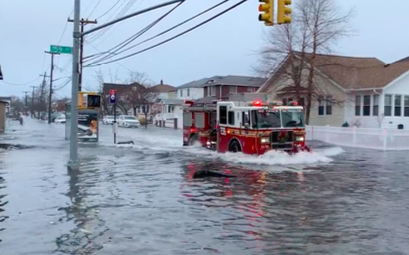New Jersey Sea Grant Consortium Selected for NOAA’s Sea Grant and Disaster Preparedness Programs
For the second time, NOAA’s National Sea Grant College Program and Office of Response and Restoration’s (OR&R) Disaster Preparedness Program (DPP) have partnered to competitively solicit and select projects to support innovative all-hazard preparedness, response, and recovery initiatives for coastal communities.
A total of $ $634,936 in FY23 federal funds will support four projects in New Jersey, North Carolina, Oregon, and South Carolina. Each project takes a different approach tailored to local needs regarding disaster preparation.
“The partnership initiative brings together the goals and expertise of NOAA’s Disaster Preparedness Program together with Sea Grant’s on the ground, innovative approaches to community support. The local knowledge and relationships of each selected Sea Grant program is a vital part of successful planning and collaboration to prepare for and respond to disasters,” commented Jonathan Pennock, Director of the National Sea Grant College Program.

Photograph of flooding in neighborhoods surrounding Jamaica Bay, New York City, including flooding on 2022 Dec 23 which was the second highest in 20 years.
The four Sea Grant-based projects will assist NOAA, partners, and coastal communities to effectively prepare for, respond to, and recover from all hazards, including coastal disasters. The projects focus on several aspects of the shared goals of the two partnering programs.
“The Office of Response and Restoration Disaster Preparedness Program is pleased to support the implementation of four new projects in vulnerable coastal communities. We believe that they will directly benefit the public by providing them with additional resources to help mitigate the impacts of coastal disasters”, said Kate Wheelock, Director of the Disaster Preparedness Program.
New Jersey Sea Grant Consortium, alongside colleagues at New York Sea Grant and Stevens Institute of Technology, will be working on “Co-developing ensemble flood forecast products to improve communication and preparedness across diverse populations.” This project leverages the The Stevens Flood Advisory System (SFAS) and its large user base to study ensemble forecast communication and to co-produce an improved forecast website and set of decision-support tools. The Stevens Flood Advisory System (SFAS) is a unique and widely-used academic coastal total water level forecast system that has provided ensemble forecasts year- round since 2015.
Dr. Peter Rowe, NJSGC Executive Director and PI of the project states: “We are pleased that NJSGC can support Dr. Orton and Stevens Institute of Technology in their evaluation and improvement of the SFAS so that it is more accessible and more utilized by both current and new users, especially by individuals and agencies from New Jersey’s overburdened communities.”
Inequalities in coastal risk management have led to disparities in exposure to extreme events, social vulnerability and recovery outcomes. An important step in addressing this inequity is to create flood forecast systems and communications with an approach that is inclusive of underserved and underrepresented (UU) communities.
Our nation’s coasts include many estuarine areas with major cities and diverse communities facing a high level of flood risk. When projects are created in partnership with populations that have been historically underserved, these entire communities can benefit. Here, we propose a project that leverages SFAS and its large user base to study ensemble forecast communication and to co-produce an improved forecast website and set of decision- support tools. The primary objectives are: (1) gather end-user feedback and input on the SFAS forecast website, (2) to create an improved forecast website and set of options for viewing flood metrics, and (3) to expand the user base, including different geographic areas and UU populations.